What is the name of the country labelled "B"?
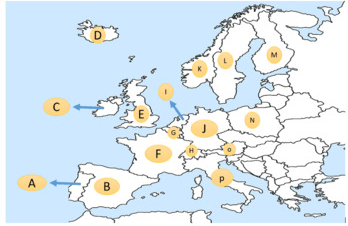
Spain
The first industrial revolution was a shift from an _______ and handicraft economy to an industrial economy.
Agrarian or Agricultural
What was one unfortunate effect of the first industrial revolution on children?
It led to the use of child labor
Over what two centuries (11th, 12th, etc) did the Second Industrialization take place?
19th and 20th
or
1800's and 1900's
Where was the only places with railway before the late 19th century (1900s)?
Britain and northern europe
What is the name of the country labelled "E"?
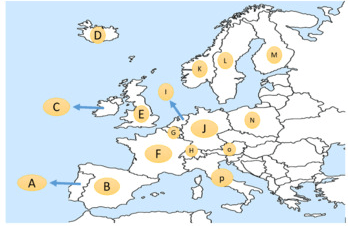
United Kingdom or Britain
Where did the First Industrial Revolution start?
Britain (United Kingdom is acceptable but remember it was called Britain in the 18th century)
What happened to the typical industrial workplace from the 1700s to the 1800s century in terms of organization and efficiency? Give one example.
Examples:
-People worked in larger, more open factories instead of cramped barns for example
-Use of machines instead of production by hand
Name one of the innovations associated with the Second Industrial Revolution.
Railways/Trains, steam ships, telegraphs
What places were the slowest to increase their mileage of railway?
Asia (China and Japan)
What is the name of the country labelled "J"?
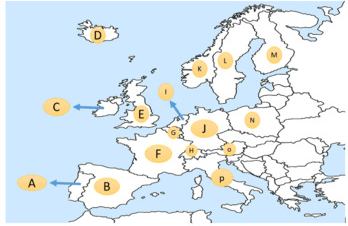
Germany
Name one of the major factors that led Britain to industrialize first.
Any of:
-Access to raw materials like metals and coal
-Surplus / specialized labor
-Access to the ocean
-Access to large spaces of open land
What types of materials were available to Britain that helped them industrialize? Name at least 2.
Any of:
-Coal
-Iron
-Copper
-Lead
-Manganese
-Zinc
What were some of the first places to industrialize after Britain?
The United States and/or the rest of Europe
What did the Charter Oath (constitution) of the Meiji government in Japan say they would do with social classes
-Bring them together
-Have them all make decisions together
-Give them the freedom to pursue their own calling
What is the name of the country labelled "P"?
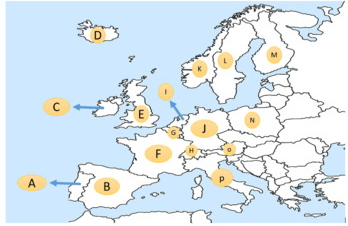
Italy
What was one of the effects of the first industrial revolution on the availability of goods such as cotton cloth and why?
Any of the following:
-Increased Britain's manufacturing output (made good more available) because of increased efficiency with machines
-Increased demand for these more available, cheaper goods
One of the reasons Britain industrialized before places like China was the access to open land with largely untouched ecological (environmental) resources. Where was this land?
America
What was one of the major travel/communication effects of the second Industrial revolution? Explain your answer.
Any of the following:
-Reduced travel times because of steam ships and increased use of railway.
-Faster communication times because of the use of the telegraph as opposed to letters
Journalist Ernest Edwin Williams was afraid of which country catching up or surpassing Britain in terms of economic power?
Germany
What is the name of the country labelled "G"?
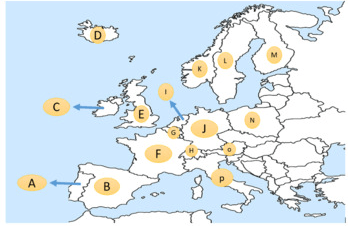
Belgium
Why didn't China industrialize as quickly as Europe did?
-They did not adopt policies that favored industrialization because their government was peaceful economically stable, unlike Europe.
-Lack of transportable coal and metals
What was one way Britain lagged behind other countries when considering their competitors in Asia?
Population (They had a small population)
What effect did the second industrial revolution have on the economies of the countries that industrialized? Explain your answer.
It improved the economies of those countries by allowing for the production, sale and distribution of goods in bulk because of more efficient transportation in the form of large steam ships and railway. Also people could communication about their business transactions easier because of the telegraph.
How much faster could people communicate due to the telegraph in terms of time? Say how long it took to communicate a message from Europe to Asia before and after the telegraph.
Before: 4-5 months (I will accept 3 to 7)
After: 20 to 30 minutes (I will accept anything less than an hour)